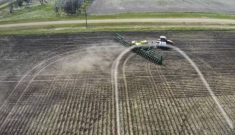The 8.9 magnitude earthquake that shook Japan at 2:46 p.m. on March 11 has shaken up the rest of the world as well, including the world of farm machinery. And just as the size and power of the earthquake itself was unexpected, so too has been the collateral fallout.
As authorities in B.C. continue monitoring for drifting radiation from the devastated nuclear facility in Fukushima, corporate managers at manufacturing centres the world over are coping with the upheaval in component supply from Japanese industry.
Nowhere has that shortage of manufactured parts had more impact than in the automotive sector. Toyota, a Japan-based company, was hit particularly hard. Initially, it was forced to close all its plants in that country. But Toyota was also determined to show that it would get right back to work, and by March 21, 10 days after the quake, the factory producing parts needed by North American auto assembly plants had resumed operations, easing supply fears here.
Read Also

How scientists are using DNA and climate data to breed crops of the future
A method for forecasting how crops will perform in different environments so that plant breeders can quickly select the best parents for new, climate-resilient varieties.
In a press release, the company said it expected to reopen all its Japanese facilities — at least temporarily — by April 27. However, Toyota also confirmed that overall output would likely be limited to about 50 per cent of normal. And even that may not last.
An official statement from Toyota said the firm will re-evaluate whether all those plants can remain open “after reassessing the parts supply situation.” With the country and its workforce still in shock, disruptions including intermittent power outages make the ongoing threat of unanticipated and unpredictable shutdowns a real possibility.
This is just one of the scenarios playing out with all the Japanese automakers. So while people around the world have admired Japan’s determination to overcome the quake, the reality is only now emerging of just how big and how damaging the challenge in front of them is.
Companies on both sides of the Pacific are affected. North American operations of all the major auto manufacturers are feeling the parts-supply pinch. General Motors’ Shreveport, Louisiana, truck assembly facility was the first North American plant to face a shutdown because of a shortage of components from Japanese suppliers. GM was also forced to close an engine plant in Buffalo, New York.
Perhaps most importantly, no one is really sure when things will get back to normal. Companies are looking to source parts from alternative suppliers, but that kind of structural change is bound to take time.
While the media has paid a lot of attention to all this mayhem in the auto industry, it turns out parts shortages are starting to cause trouble for some farm equipment manufacturers too. With global demand for farm machinery remaining one of the strongest segments of the economy, that kind of potential disruption couldn’t come at a worse time, particularly as farm equipment manufacturers were once again talking about soaring revenues for the 2011 calendar year. Projections inside some corporate offices put this year’s income estimates for a few of them up there with the good times of 2008.
“According to our forecasts, the company is on track to earn record profits for the full year of 2011,” said Samuel Allen, John Deere’s president and CEO, in a speech at a shareholder’s meeting only weeks before the earthquake and tsunami.
CNH, too, expected a very good year. On the April 21 it released its first-quarter financial statement for 2011, showing overall revenues up by over 17 per cent and profits soaring by a whopping 71 per cent compared to the same period last year.
Interruptions that hamstring a company’s ability to deliver finished machines to dealer lots mean reduced profits from lost sales. If a major publicly traded corporation fails to meet its projected revenue targets, share prices — meaning the company’s value — drop. That’s bad news all around.
Japan-based Kubota may be the hardest-hit farm equipment manufacturer. In a press release, the company announced it had suffered damage to all five of its facilities in that country. The plants have since resumed production but output is being hampered by the same constraints the Japanese auto industry is facing, including parts shortages and intermittent power outages. Just how significant that disruption is going to be to the company’s bottom line is not yet clear.
“The amount of damage caused by the earthquake is not examined at this moment,” reads an update on Kubota’s global media site. “An announcement will be made promptly if a significant impact on Kubota’s consolidated financial result is anticipated.”
In its first-quarter statement, CNH said it is monitoring the medium-term effects from the earthquake on its business partners and component suppliers, adding that none of its “tier-one” suppliers have suffered “irreparable” damage. Even so, CNH expects that disruptions to the normal flow of component parts from Japanese suppliers will cause periodic production slowdowns for the next six months or so, primarily in its construction equipment division. The manufacture of certain products, specifically excavators, could be particularly hard hit during that time.
And here’s the really bad news for CNH. Estimates say that the economic impact could negatively affect full-year revenues by between $300 and $500 million, dropping operating profit $40 to $60 million. That’s a pretty hard hit. Despite that, executives remain optimistic, saying they will stick with their initial belief the company can achieve a 10 per cent increase in overall revenues for 2011.
John Deere’s first-quarter financial report was released before the earthquake and, as at press time, the company had said nothing about any impact on its operations. A COUNTRY GUIDE request for comment was not replied to.
AGCO’s chairman, president and CEO Martin Richenhagen, addressed his company’s position on the earthquake’s impact, saying it will have virtually no effect because the company has no major suppliers in the region.
Here, in Canada, management at Buhler Industries, parent company of the Versatile and Farm King lines, says its operations will not be significantly affected either — at least in the short term.
“Versatile has two direct suppliers in Japan. Both of them are located south of Tokyo, far away from the major disaster areas,” said Buhler’s vice-president Maxim Loktionov. “Both companies have reported that their employees, families, equipment and facilities are safe and not damaged. However, some of their casting, forging, and machined parts suppliers are close to affected areas and may encounter power supply limitations and possible damages.”
Over the next few months Buhler’s Winnipeg tractor assembly plant should not face any component shortages. That is due to adequate in-house parts stocks and shipments already in transit. But in the longer term, things are less clear. “The scope of the disaster within our sub-suppliers in Japan has not been finalized yet, but our suppliers will try to keep the situation under control,” Loktionov says.
That statement seems to sum up the situation most major farm equipment manufacturers now find themselves in.
As disruptions continue in the transportation sector within Japan and at its seaports, along with the protracted nuclear crisis, the situation for component manufacturers in that country remains difficult.
The longer it takes Japan to recover, the more likely it is most farm equipment manufacturers will experience some level of difficulty keeping output levels up. Ultimately, that could translate into longer wait times for farmers who want to buy new tractors and machinery. A quick Japanese recovery will go a long way toward helping everyone.CG
———
Japan-Based Kubota May Be The Hardest-Hit Farm Equipment Manufacturer















